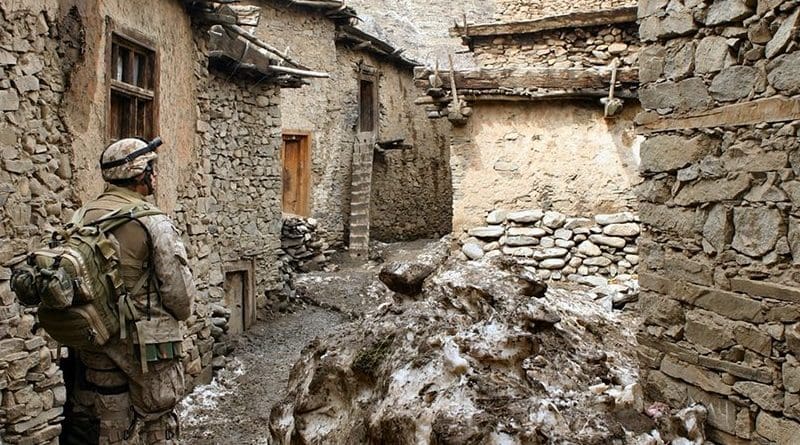Trump Wants US Out Of Afghanistan By Christmas – Adviser
By VOA
By Carla Babb
President Donald Trump’s national security adviser says a presidential tweet last week that all U.S. troops should be home from Afghanistan by December 25 was a “desire” rather than a military order, and he reaffirmed a plan to decrease U.S. numbers to 2,500 — not zero — by early 2021.
“There would be nothing greater than to have our troops home by Christmas, but right now we’re on a path with our European allies — we went into Afghanistan together; we’re going to come out together — we’re on a path right now that looks like about 4,500 this fall and a smaller number in January and February,” national security adviser Robert O’Brien said Friday in a webinar hosted by the Aspen Institute, a nonprofit group that promotes creation of free and equitable societies through seminars and leadership development programs.
O’Brien reiterated his announcement made last week that the United States was “going down to 2,500 troops” in “the early part of next year,” adding that the U.S. would love to exit earlier “if the conditions permit it.”
“I think that’s the desire the president was expressing,” O’Brien said.
Trump last week tweeted the U.S. would be withdrawing from Afghanistan by Christmas. The announcement via Twitter drew confused reactions among defense experts. Top officials in the Pentagon were silent on the matter for several days.
One U.S. military official, speaking on condition of anonymity, told VOA hours after the president’s tweet that it was the “first word” anyone had seen about an accelerated withdrawal timeline in Afghanistan.
The Pentagon also has yet to confirm O’Brien’s repeated assertion that the U.S. will drop to 2,500 troops early next year.
“U.S. force levels in Afghanistan remain on trajectory to reach 4,500 by November 2020. Beyond this, DoD [the Department of Defense] will not speculate on future troop numbers or timelines as continued drawdowns remain conditions-based,” Pentagon spokesman Army Major Rob Lodewick told VOA in an email on Thursday.
‘Speculation’
When asked by NPR on Monday about drawing down to 2,500 troops in Afghanistan, the top U.S. military officer, Joint Chiefs Chairman General Mark Milley, dismissed the assertion as “speculation.”
“I think that Robert O’Brien or anyone else can speculate as they see fit. I’m not going to engage in speculation. I’m going to engage in the rigorous analysis of the situation based on the conditions and the plans that I am aware of, and my conversations with the president,” Milley said.
O’Brien responded Friday during the Aspen Institute webinar. “I wasn’t speculating then, and I wasn’t speculating today. … I’m speaking to the president.”
Defense experts have cautioned against complete foreign troop withdrawals from Afghanistan, and against reducing forces too quickly. But politicians are reflecting Americans’ declining support for the war. Last year, opinion polls showed slightly fewer than half of American adults thought that the decision to send U.S. troops to the country was a mistake. At the time of the 2001 invasion, 89% of Americans supported sending in troops.
Bradley Bowman, senior director of the Center on Military and Political Power at the Foundation for Defense of Democracies, told VOA the “last thing” the U.S. would want would be for U.S. equipment or bases in Afghanistan to fall into the hands of the Taliban.
Wrong message
“Imagine the message that sends our allies, adversaries and terrorists around the world. Talk about a terrorist recruiting and radicalization bonanza,” Bowman said.
O’Brien on Friday agreed with statements by military leaders and experts that the U.S. must continue “to make sure that Afghanistan is not a place where terrorists against the United States have safe haven.”
“It’s unsustainable for us to be in these countries forever,” O’Brien said, referring to Afghanistan, Iraq and Syria, but “there’s always going to be some sort of a CT [counterterrorism] component to what we’re doing, at least in Afghanistan.”
In two interviews with VOA — one exclusive in July and one joint interview with two other reporters in September — General Kenneth “Frank” McKenzie, the top military officer in charge of operations in the Middle East, said, “The Taliban have still not shown conclusively that they’re going to break with al-Qaida,” the terrorist group that launched the deadly attacks on U.S. soil on Sept. 11, 2001.
“We need to be assured that ISIS [Islamic State] and al-Qaida do not have the opportunity to be hosted in Afghanistan and develop attacks against the West,” McKenzie told VOA. “Right now, it is simply unclear to me that the Taliban have taken any positive steps in that.”

